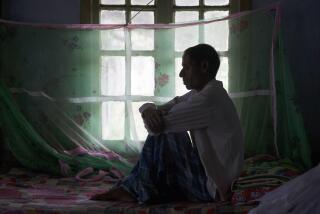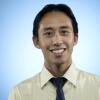Rise in measles prompts concern
The United States is on track to report its highest incidence of measles cases since 2001, exacerbated by a rise in outbreaks worldwide and by clusters of people who are opting out of the vaccine because of religious beliefs or fears of a purported link between the shot and autism, health officials said Thursday.
As of April 25, there were 64 reported cases of measles nationwide this year, including 12 in San Diego.
One in five cases required hospitalization, said Dr. Anne Schuchat, director of the National Center for Immunization and Respiratory Diseases at the U.S. Centers for Disease Control and Prevention.
There were about 30 cases of measles in all of 2007.
Before the advent of federally funded vaccine programs in the last decade, outbreaks spread quickly among low-income children who lacked access to vaccinations.
“Now, I think we’re seeing a different trend with communities or pockets of under-immunized children” that are more linked to vaccine exemptions, Schuchat said.
Measles is a highly contagious disease that can cause a rash, high fever, cough, runny nose and red watery eyes. It also can cause diarrhea, ear infections, pneumonia, brain injury, seizures and death.
Before the measles vaccine was introduced in 1963, there were up to 4 million reported cases and up to 500 deaths each year in the United States. But vaccination programs were so successful that public health officials declared widespread transmission of the disease eliminated in 2000.
The recent outbreak that infected a dozen children in San Diego underscores the concern of public health officials.
An unvaccinated 7-year-old boy who visited Switzerland brought the disease to his school in January.
Nearly 10% of the students at the San Diego Cooperative Charter School had received personal-belief exemptions from vaccinations.
The boy infected five children at his school, four at his doctor’s office and his two siblings. All were unvaccinated.
A separate outbreak, centered in Tucson, spread after an adult visitor from Switzerland in February was hospitalized for measles and pneumonia.
As of Thursday, there have been at least 17 confirmed cases, and all had no records of vaccination. The outbreak is ongoing.
Measles cases are on the rise in New York City, with 22 cases reported in Brooklyn. Health officials have linked those cases to outbreaks in Europe and Israel.
Switzerland, for example, is facing its most severe outbreak in the last decade; 2,000 people have fallen ill in the last two years. The disease has spread especially rapidly in communities that believe in alternative medicine and avoid vaccination.
In Israel, 1,000 people have fallen ill since August in an outbreak that started among nonimmunized ultra-orthodox communities in Jerusalem.
In Los Angeles County, officials reported one measles case in April in which a preschool-aged child was hospitalized.
U.S. health officials are concerned about small but increasing numbers of parents who are choosing not to vaccinate their children.
At least 10 epidemiological studies have discredited theories linking the measles vaccine to autism, said Dr. Paul Offit, chief of infectious diseases at Children’s Hospital of Philadelphia.
But the skepticism has had an effect: Of the 64 who have fallen ill in the United States this year, 63 had no records of vaccination. (The vaccine is 99% effective but can fail in a small number of cases.)
“As you start to see an erosion of confidence in vaccines and there are pockets of people choosing not to vaccinate, this is what you’ll see,” said Offit, a co-inventor and co-patent-holder of the vaccine for rotavirus. “Measles is not eliminated from the world.”
Sizable outbreaks have hit nations in Europe where distrust of vaccines is stronger. Public skepticism rose sharply after a 1998 report in the medical journal Lancet linked the measles vaccine to autism.
The report’s conclusion was retracted by 10 of 12 coauthors six years later, but, in the meantime, public confidence in the vaccine dropped and measles cases rose.
Though immunization rates are far higher in the United States, some researchers are concerned that trust is eroding among its residents as well.
In California, 1.11% of kindergartners had received personal-belief exemptions from vaccines in 2002; four years later, 1.41% of kindergartners had received such exemptions.
Though only 0.85% of Los Angeles County’s kindergartners had personal-belief exemptions from vaccines in 2006, 1.56% received exemptions in Orange County, 2.06% in San Diego County, 3.07% in Santa Barbara County and 4.12% in Marin County in the Bay Area.
Despite overwhelming evidence by mainstream scientific organizations refuting a link between vaccines and autism, it remains a popular topic for some websites, some celebrities and Hollywood.
In January, ABC-TV broadcast its premiere episode of “Eli Stone,” in which a lawyer wins a $5.2-million judgment after arguing that a mercury-based preservative in a vaccine triggered autism in a child. The American Academy of Pediatrics had urged the network to cancel the program.
In March, the U.S. Department of Health and Human Services’ Division of Vaccine Injury Compensation agreed to pay an undisclosed amount to the family of a now 9-year-old girl whose parents said she showed autism-like symptoms after receiving a series of vaccinations as a toddler.
Vaccine critics say the case demonstrates a vaccine-autism link. But government officials say that the case makes no such concession, and that the girl had an extremely rare condition that most autistic children do not have.
Jenny McCarthy, a former Playboy model and actress who has written about raising an autistic son, has appeared twice on “Larry King Live” since September, arguing that vaccines trigger autism.
In her most recent appearance in April, McCarthy said, “This debate is over. Vaccines can trigger autism. . . . I’ve confirmed it.”
Questioned on whether her conclusion was based on scientific or statistical evidence, McCarthy said, “I believe that parents’ anecdotal information is science-based information.”
Researchers say that is a wrong approach. Study after study has shown no link, they say.
A recent study of California children showed that autism rates continued to rise after most vaccine manufacturers in 1999 removed thimerosal, the mercury-based preservative in childhood vaccines that critics have targeted.
“It gets to the point where somebody is just wrong, and it’s not only wrong, but it can potentially hurt their child or someone who sits next to that child,” Offit said.
More to Read
Start your day right
Sign up for Essential California for news, features and recommendations from the L.A. Times and beyond in your inbox six days a week.
You may occasionally receive promotional content from the Los Angeles Times.







